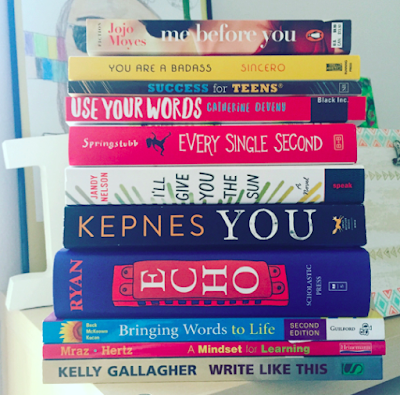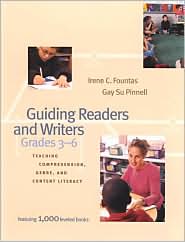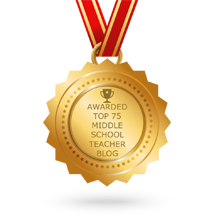In 180 Days:Two Teachers and the Quest to Engage and Empower Adolescents, Gallagher and Kittle state, "Every day we send a consistent message: Everyone reads in this class." (page 49)
Me: same.
Every day kids read their Just Right books. Every day I take status of the class and ask them what they're reading. When they abandon a book, I know. When they leave the book at home three days in a row, I know. When they finish a book, I know. When someone reads a great book, we tell the class about it. They add to To Be Read Lists after book talks and they log all the titles of the books they complete. In my class, kids read during our block, and they read the 20 pages every night assigned as homework, because every day, I ask them how it's going. I expect them to read VOLUMES of text, and they do!
We also have to confer with our students for lots of reasons:
- To help the kid who has never picked a book pick one.
- To find out why another keeps leaving their book at home.
- To figure out who is "fake reading" and who's actually really reading (comprehending).
- To see if they are applying the strategies from universal curriculum into their texts.
- To be the person to look a kid in the eye and be there, just with them, to listen to how a book changed their thinking.
- To share a joy and love and passion for a book or a character. (Edward Tulane, anyone?) :-)
Every day while students read, teachers confer. Kittle and Gallagher note that in a ten minute period, they aim to talk to 3-5 students. To begin the year, they focus on getting to know the students' reading habits. These are fact-finding conferences. Information is collected and recorded. These early conferences may go like this...
If a student indicates that he or she likes to read, Gallagher and Kittle follow up with:
- What do you like to read?
- What are your favorite genres?
- Who are your favorite authors?
- Do you have a favorite series?
- What are you currently reading?
- How do you find time to read?
- Where do you read?
- When do you read? (page 32)
If a student indicates they do not like to read, they follow up with:
- Why don't you like to read?
- Did you like reading when you were younger? If so, when did you stop liking reading? What caused this shift?
- When was the last time you selected a book on your own to read?
- Have you ever read a book you liked?
- Can you name an author you like?
- What interests you? What do you do in your free time? (page 32)
It's going to be day 3 of school here in D100 tomorrow. It's getting close to the time when students will begin picking books. Time for Kidwatching (Goodman): who will easily pick a book and settle in? Who will avoid books at all costs? Who will pick one, then return it, then pick another? Who will sustain reading for 25+ minutes? Who can recommend a book?
And what will we find out when we sit down and give our time and hearts to each child, individually? Hopefully these prompts for conferring with kids will get you going!













































































